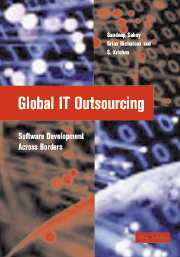Book contents
- Frontmatter
- Contents
- List of figures
- List of tables
- List of boxes
- Foreword
- Acknowledgements
- List of abbreviations
- 1 Introducing the phenomenon of global software work
- 2 Globalization and global software work
- 3 GlobTel's GSA programme in India
- 4 The GlobTel–Witech relationship: a ‘standardization’ perspective
- 5 Global software work: an identity perspective
- 6 The GlobTel–MCI relationship: the dialectics of space and place
- 7 Managing the knowledge transfer process: the case of Sierra and its Indian subsidiary
- 8 The case of Gowing and Eron GSA: power and control
- 9 Cross-cultural communication challenges: GSAs between Japanese and Indian firms
- 10 Reflections and synthesis on theoretical insights
- 11 Managerial implications
- Index
- References
2 - Globalization and global software work
Published online by Cambridge University Press: 14 January 2010
- Frontmatter
- Contents
- List of figures
- List of tables
- List of boxes
- Foreword
- Acknowledgements
- List of abbreviations
- 1 Introducing the phenomenon of global software work
- 2 Globalization and global software work
- 3 GlobTel's GSA programme in India
- 4 The GlobTel–Witech relationship: a ‘standardization’ perspective
- 5 Global software work: an identity perspective
- 6 The GlobTel–MCI relationship: the dialectics of space and place
- 7 Managing the knowledge transfer process: the case of Sierra and its Indian subsidiary
- 8 The case of Gowing and Eron GSA: power and control
- 9 Cross-cultural communication challenges: GSAs between Japanese and Indian firms
- 10 Reflections and synthesis on theoretical insights
- 11 Managerial implications
- Index
- References
Summary
Introduction
Global software alliances (GSAs) are work configurations in present-day processes of globalization. GSAs involve the restructuring of work arrangements across time and space based on the underlying assumption that the experience of the ‘here’ and ‘now’ of software development can be largely superseded by action at a distance. GSAs represent the state of the art in software development because of the inherent potential they provide organizations for standardizing, measuring and coordinating distributed resources, including HR and resources of time and space. GSAs reflect Mowshowitz's (1994) vision of a future paradigm of management based on the principle that the ‘best’ and ‘cheapest’ HR can be ‘switched’ as required and assembled from around the globe and coordinated through the use of ICTs and standardized methodologies and processes. These underlying principles provide the basis for popular claims that software development can ‘follow the sun’ with round-the-clock operation by exploiting time-zone differences allowing cycle-time reductions in handling work between sites located in different parts of the world. Such a vision of GSAs as an arena in which the ‘switching of resources’ takes place is no longer merely a speculative phenomenon of the future, but one that is being actively attempted by firms globally, with varying degrees of success.
The aim of this chapter is to understand the mutual interconnection between processes of globalization and global software work (GSW).
- Type
- Chapter
- Information
- Global IT OutsourcingSoftware Development across Borders, pp. 27 - 50Publisher: Cambridge University PressPrint publication year: 2003



